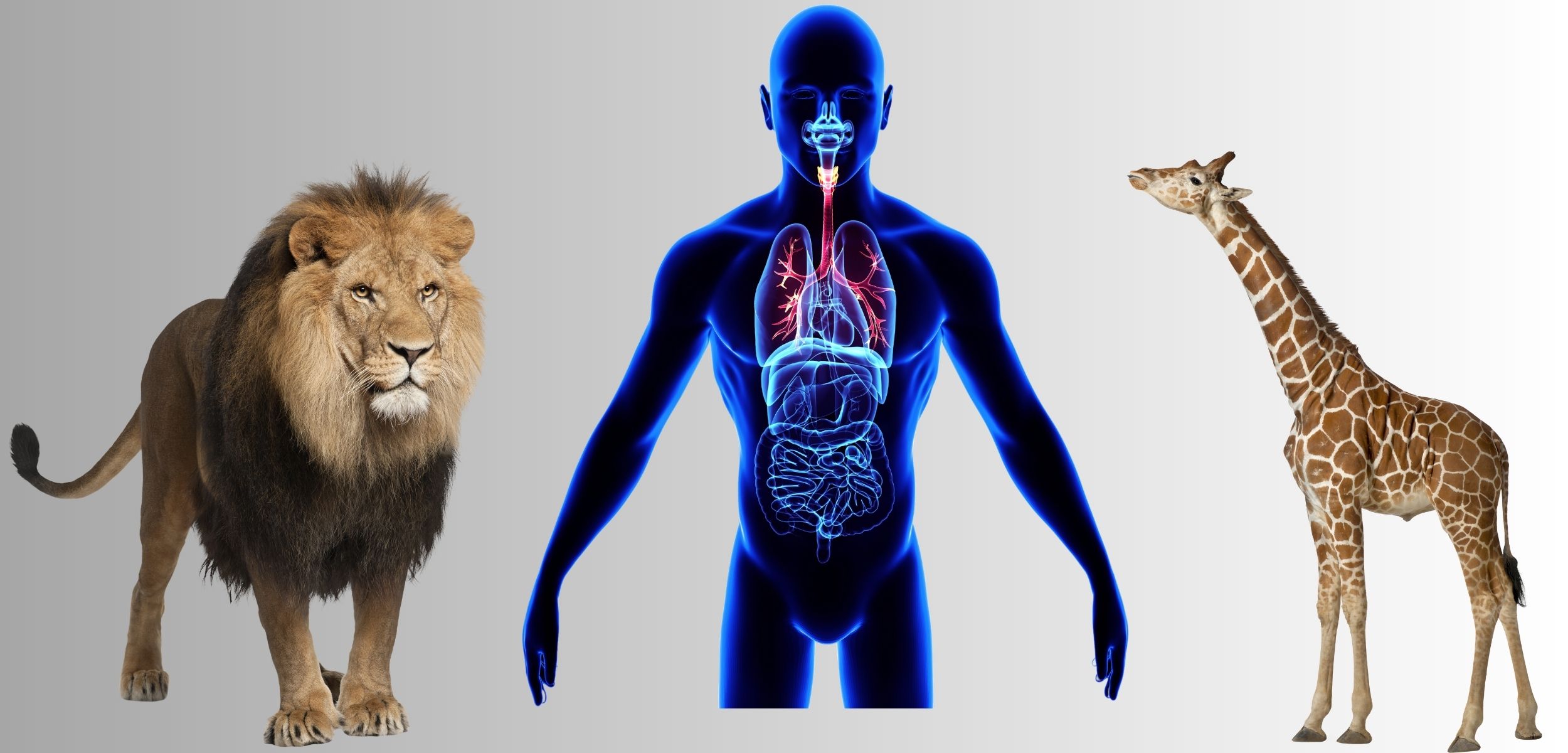A Carnivorous Meat Eating Machine, The Lion:
Digestive System
The lion’s digestive system is optimized for an exclusively carnivorous diet, which is why its dietary tendency is to hunt living prey for food rather than to graze.
Why?
- A Short Digestive Tract: A relatively short gastrointestinal tract allows for the rapid digestion and absorption of proteins and fats, the primary components of their meat-based diet.
- Strong Stomach Acidity: The lion’s stomach secretes potent hydrochloric acid, facilitating the breakdown of meat, bones, and connective tissues.
- Specialized Teeth and Jaws: Sharp, pointed teeth and powerful jaws enable the lion to tear and chew meat efficiently. Though great for meat-eating purposes, these teeth would be lousy for grazing and grinding vegetation.
What’s happening inside?
- Enzyme Production: Lions produce enzymes like protease and lipase that are specialized in breaking down and efficiently utilizing proteins and fats.
- Limited Carbohydrate Metabolism: Unlike herbivores, lions have a limited ability to metabolize complex carbohydrates, reflecting their meat-centric diet.
Veggies Only Please, The Giraffe:
Digestive System
The giraffe’s digestive system is uniquely adapted to a herbivorous diet:
- Ruminant Digestion: As a ruminant, the giraffe has a complex, multi-chambered stomach that facilitates the fermentation of plant matter, breaking down cellulose through microbial action.
- Long Digestive Tract: The extended gastrointestinal tract allows for the slow digestion and absorption of nutrients from fibrous plant materials.
- Specialized Teeth and Tongue: Flat, grinding teeth and a prehensile tongue enable the giraffe to chew and process tough plant matter, but would be terrible at cutting through muscle, connective tissue, and bone as with a meat-eater.
What’s happening inside?
- Cellulase Production: Though not produced by the giraffe, symbiotic microbes in its gut produce cellulase, an enzyme that breaks down cellulose, a primary component of plant cell walls.
- Complex Carbohydrate Metabolism: The giraffe’s biochemistry supports the digestion of complex carbohydrates found in plants, reflecting its exclusively herbivorous diet.
The Human:
The stark contrasts between the lion’s carnivorous adaptations and the giraffe’s herbivorous specializations illuminate the multifaceted nature of dietary form and function based on the biological needs of each animal.
In humans, the omnivorous diet represents a balanced fusion of these two extremes, reflecting our unique position in the animal kingdom.
Our digestive system and biochemistry are fine-tuned to process and utilize nutrients from both plant and animal food sources, offering a dietary harmony that resonates with our divine design.
Understanding And Optimizing The Omnivorous Diet
Nutritional Completeness
An omnivorous diet offers a broad spectrum of nutrients, including proteins, fats, carbohydrates, vitamins, and minerals. This diversity ensures the body’s complex biochemical needs are met, supporting growth, energy metabolism, immune function, and cognitive health.
Because of the wide diversity of human ethnicities, the omnivorous diet’s adaptability allows for alignment with various cultural, seasonal, and personal preferences when kept in balance.
For example, carne asada tacos with refried beans in Mexico, spicy Chicken curry over rice from Thailand, or smoked beef brisket with potato salad in Dallas, Texas.
Though each example above is unique in composition and preparation, they all still reflect that strategic combination of meat, vegetables, carbohydrates, spices, herbs, and fats within the omnivorous diet, which is essential to good health for the human animal.
When Preference Affects Harmony
The Vegan/Vegetarian Diet:
Nutrient Deficiencies
While vegan and vegetarian diets are rich in fiber, antioxidants, and specific vitamins, they often lead to deficiencies in Vitamin B12, iron, omega-3 fatty acids, and complete proteins.
These deficiencies can manifest in various serious health issues:
- Vitamin B12: Essential for nerve function and blood formation, a lack of B12 can lead to neurological disorders and anemia.
- Iron: Plant-based iron is less bioavailable, potentially leading to iron-deficiency anemia.
- Omega-3 Fatty Acids: Important for brain health; a deficiency may affect cognitive function.
- Vitamin-D and Calcium Deficiencies: Though plant-based diets can include trace amounts of Vitamin-D and Calcium, these sources are not as bio-available as that which is found in dairy products and fish.
- Protein Deficiencies: A crucial component for ensuring strong muscles, the lack of complete animal-sourced amino acids within a vegan/vegetarian diet is detrimental to the quantity, quality, and functional health of various types of muscle tissue within the human body.
IN CONTRAST
Carnivorous and Atkins-Style Diets:
Nutrient Imbalances
These diets, focusing exclusively on animal products, lead to significant nutrient imbalances:
- Saturated Fats and Cholesterol: Excessive intake can increase the risk of heart disease, vascular plaque, and imbalances in HDL/LDL cholesterol.
- Protein Toxicity: An over-consumption of protein exclusively can have toxic effects on the body and lead to dehydration, kidney stress, decreased bone mineral density, and metabolic imbalances.
- Deficiencies in Fiber and Certain Vitamins: Lack of fiber can affect digestive health, while deficiencies in vitamins like Vitamin C, D, E, and B-complex, and minerals such as Calcium, Magnesium, and Potassium can have broader health implications.
Health Risks
Long-term adherence to such diets has been associated with increased risks of certain cancers, cardiovascular diseases, and metabolic disorders. Though this approach is typically most popular for weight loss, it is not sustainable and should be avoided.
ULTIMATELY:
With its balanced and inclusive approach, the omnivorous diet emerges as a scientifically sound option for supporting the optimal health of humans while providing us with a wealth of food options to satisfy our emotional enjoyment of eating!
Joe Carson B.S. NASM-CPT/FAS/CN
Master Trainer/Functional Aging Specialist/Certified Nutritionist
Twenty-First Century Aging





